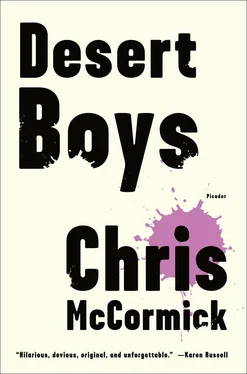I watched him wade into the lake, one long, splashless stride at a time. I had no idea what this boy was doing. I was confused and my headache was flaring up — otherwise, I might’ve shouted, Someone’s getting into the lake! When he was knee-deep in the water, he hunched over and covered his ears.
Then the ground shook, and I dropped my corn.
THE TRANSCRIPT, 3/3
DK:What do you believe in?
JS:I believe in Oakland’s next beginning. I spent a lot of time reading Zen philosophy in high school: D. T. Suzuki, mostly, despite his charmless nationalism. I still believe in some of that, the illusory nature of beginnings and endings. I believe in working to make beginnings breed off each other. I believe everyone can contribute their own beginnings to the city — whether it’s business or art or an idea for the classroom — if they have the time and energy and luck and support to find out what it is. I believe in celebrating differences instead of pretending we’re all the same. What else do I believe in? I believe in Beyoncé. [ Laughter. ]
DK:Are you dating anyone?
JS:You’re never going to ask about my plans as mayor, are you?
DK:I just want to paint a more complete picture of your life than your career.
JS:She’s a photographer and a sound artist I met in college, believe it or not.
DK:A sound artist?
JS:Yeah. She makes noises on her computer, and then syncs them up with symphonies in Japan. I don’t really get it, either, but it’s what she does, and she keeps winning prizes and everything, so I just trust, at this point, that she’s a genius.
DK:Is she Japanese?
JS:No, she’s a black girl from Oakland. She’ll be photographing me when we get back. Speaking of Oakland—
DK:One last question about the Antelope Valley. I promise it’ll be the last.
JS:[ Sounds of the espresso machine. ]
DK:Did you ever find out who painted the mustache on the mascot?
JS:No. I couldn’t imagine anyone at that school making a political statement like that. Nobody I knew thought the mascot was in bad taste, but the Hitler mustache seemed to suggest, albeit crudely, that someone did. Did you? I mean, did you find out who did it?
DK:I’m trying to find out. I’m interviewing people. Unless you think I should let it go?
JS:Hey, if we’re not going to talk about my plans for Oakland, we should get going. We’ve got to wade through the micro-city at Sixteenth and Mission to get back to the train.
DK:I like that, “micro-city.”
JS:It feels that way sometimes. Like we live in a Russian doll made up of one community on top of another.
DK:I know we’ve been off the record for a while now, but can I use that for the article?
JS:No, it’s dumb. It doesn’t make any sense. [ Laughter. ] Let me think of something better.
THE CALL
After the park was evacuated, we worshipped our phones. We knew when and where, so we searched the internet for information regarding the other three W s: What, Why, and Who. I was on the corner of Grand and Perkins, aiming my phone’s video recorder at the emergency crews. I thought we’d had an earthquake, but then I checked Twitter. According to @Markus_2987, two homemade pipe bombs had been set off at the stage. According to @EllaElla11, however, only one bomb went off, from a compost bin at the center of the park. The low-pitched swell of the blast was still vibrating in my stomach, and I felt queasy. I couldn’t find Joshua or Jenna. I knew I may have seen a suspect in the lake, but I couldn’t remember anything about him other than his race. The name Elijah Retivat — Shelly’s son — entered my mind, but what were the chances that he and the bomber were the same person? I checked my notes, but nothing was there. So I sat, legs out, on the sidewalk, and called Lloyd.
We knew my mom wouldn’t survive through the fall. I kept pushing off introducing her to Lloyd until it was too late. He hadn’t forgiven me, and I was beginning to think he never would.
“Babe,” I said, still shaking, and as soon as he said a word — his first to me in two weeks — I started to cry.
THE BEGINNING
In the beginning, a gay sixteen-year-old boy, desperate to convince himself of the falseness of that first adjective, tried to get a sixteen-year-old girl to show him her braces.
When Kate Schaffer used to laugh, she flashed her wild teeth like the triangles of a sliced orange. Now with her braces she giggled like an aristocrat, lips closed behind a chubby white hand. Obviously I used the word “love” without meaning it just yet, but I wanted to grow into that word with her, and the only way I figured I could was to make her laugh again the way she used to laugh. This — a straight boy might’ve concocted a more sexually explicit plan — should have been my first clue that the whole experiment was a waste of time.
However. On the day of the pep rally, Kate Schaffer and I ditched our history class to — to do what? I don’t remember. She was everyone’s crush in middle school, but now she’d put on some weight and had been relegated to kissing a boy she must have known was gay. She kissed shyly; my bottom lip, for the most part, rested gently between hers. I remember liking the fact that she was bigger than me, and remember uttering the phrase, “Kiss me, Kate”: if there had been any doubt to my sexuality, these should have been strikes two and three.
The gym’s back door opened from the inside, and we stopped kissing to duck behind an air-conditioning unit. I peeked over to see a janitor prop open the door with a large trash bin and walk off some fifty feet for a smoke. He kept his back to the open door, and I grabbed Kate’s hand and ran into the equipment room.
“What are you doing?” she asked.
“I’m going to kiss you in every room on campus,” I said, and kissed her on the mouth. I could feel the metal behind her lips. “This was a tough one, but, equipment room: check.”
“Let’s go to the next one before we get locked in here,” Kate said, happy to play along.
Plopped in the corner near the basketballs and volleyball nets was the cloth head of Rebby the Blue, his blank, meshed eyes staring blandly ahead. Above him, a dry-erase board, its black tray stocked with four fat markers of blue, black, green, and red.
“One minute,” I said. I grabbed the black marker, uncapped it, and aimed it at the mascot’s face.
At the rally, when the mascot came out onto the gym’s floor, and everyone around us jumped from the bleachers and hollered and laughed, I watched Kate Schaffer laughing wildly, and saw those braces. God, I was proud — I thought, stupidly, that being able to fix the way Kate Schaffer laughed meant I’d be able to fix myself.
“Was that the last girl you ever kissed?” Lloyd asked me once, years later. We were in bed in the Noe Valley apartment we shared with two other couples, alone for the first time in a long time on a lazy weekend afternoon. The sun through the windows turned the sheets on our stomachs an impossible white.
“The one and only,” I said.
“I know it’s ridiculous, but I hate to think of you kissing someone else, even if it’s a girl. Even if it’s ten years ago.”
Our faces were so close, it didn’t take much work for me to kiss him.
“There,” I said. “Now you’re the last person I’ve kissed, no question about it.”
Читать дальше












